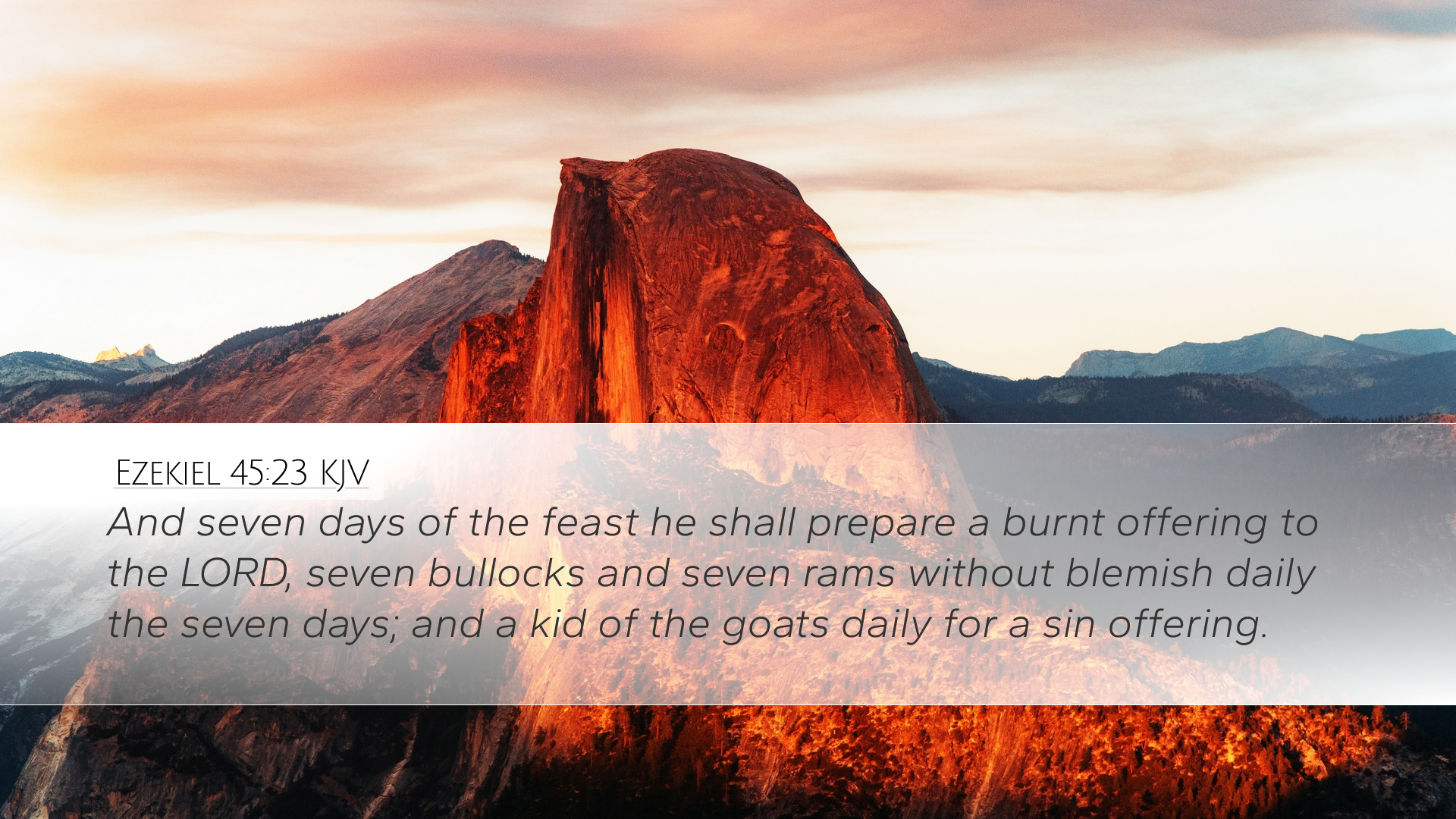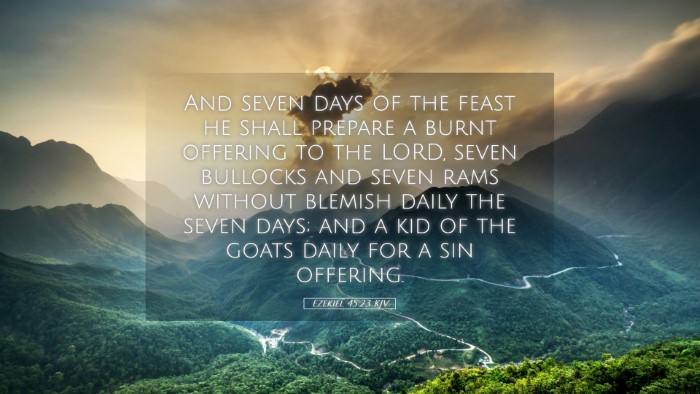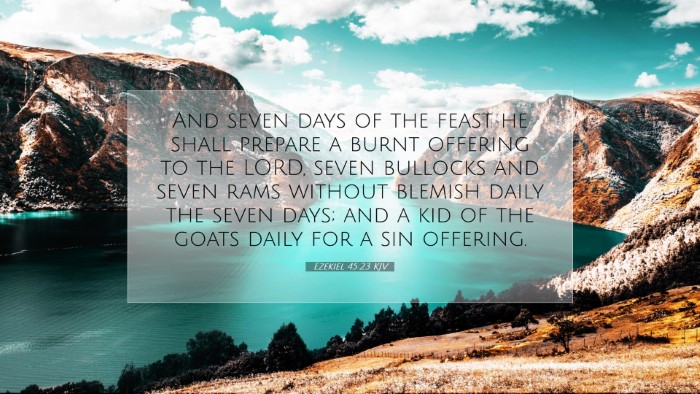Commentary on Ezekiel 45:23
Bible Verse: Ezekiel 45:23 - "And in the feasts of the seventh month shall be a day of atonement, a holy convocation shall be in Israel, and the prince shall prepare for himself and for all the people of the land a bullock for a sin offering."
Introduction
The verse from Ezekiel 45:23 forms part of a larger section in which the prophet Ezekiel details the divine ordinances and worship practices for the future temple in Jerusalem. This specific verse highlights the role of the prince during the Day of Atonement, emphasizing both individual and communal responsibilities regarding sin and forgiveness.
Context and Background
Ezekiel, a prophet during the Babylonian exile, conveyed messages that addressed the Israelite community, balancing judgment with hope for restoration. The context of Ezekiel 45 involves the establishment of a just and orderly society, promoting worship that pleases God. This chapter encapsulates the reformed Jerusalem where the people are to engage in sacrificial rites, particularly during significant feasts and sacred days.
Detailed Analysis
The Role of the Prince
Matthew Henry, in his commentary, emphasizes that the prince is to take a leading role in worship and sacrifice. This reflects the leadership necessary in religious practice, indicating that leaders should model piety and accountability. By preparing a bullock for the sin offering, the prince demonstrates humility and recognizes both his need for atonement and that of the people.
Significance of the Day of Atonement
Albert Barnes notes that the Day of Atonement (Yom Kippur) is emblematic of profound themes of repentance and reconciliation with God. It serves as an annual reminder of humanity's sinfulness and the requirement of sacrifice to attain forgiveness. In this future vision of Jerusalem, the recurring theme of atonement not only assures the Israelites of God’s mercy but underlines the continuous need for confession and repentance.
Collective Responsibility
Adam Clarke elaborates on the community aspect of worship, asserting that individual offerings benefit the entire community. This signifies that personal failures and shortcomings impact the community, and collective atonement must be emphasized. The phrase “for himself and for all the people of the land” indicates a profound solidarity and common need shared amongst the Israelites.
The Bullock as a Sin Offering
The specific mention of a bullock as a sin offering carries rich theological implications. In ancient Israel, the bullock represented a significant and costly sacrifice, symbolizing the gravity of sin and the seriousness of the atonement process. Matthew Henry points out that such offerings reflect both the severity of sin and the richness of God’s provision for atonement, reinforcing the necessity of sacrifice in the covenant relationship between God and His people.
Theological Implications
Atonement and Redemption
The practice of atonement permeates both the Old and New Testament narratives. The notion that the Day of Atonement provides a unique opportunity for restoration reflects the overarching theme of redemption that is central to the Gospel. Clarke's commentary invites reflection on how the rituals of the Old Testament foreshadow Christ’s ultimate sacrifice, reinforcing the role of Jesus as the ultimate atonement for humanity’s sins.
Leadership and Spiritual Authority
In terms of leadership, the verse encapsulates the significant role of those in authority—both civil and spiritual—within a faith community. Barnes suggests that communal worship necessitates leaders who actively engage in the spiritual practices they advocate. The call for the prince to offer sacrifices is a reminder of the accountability that leaders have in guiding their communities spiritually.
The Importance of Holiness
Ezekiel’s emphasis on the holiness of the Day of Atonement and proper worship invites contemporary reflection on the nature of worship today. As Henry observes, maintaining reverence and acknowledging God’s holiness are critical to authentic worship practices. This challenges pastors and church leaders to consider how their communities approach worship and the sanctity of sacred occasions.
Practical Applications
- Encouragement to Lead by Example: Pastors and leaders are called to embody the values of repentance and humility. Their participation in communal acts of atonement fosters a culture of accountability.
- Promoting Collective Confession: Churches should facilitate spaces for collective confession, echoing the communal nature of sin and redemption illustrated in Ezekiel.
- Understanding the Cost of Grace: The imagery of a significant offering prompts a reflection on the cost of grace, encouraging deeper theological inquiry into the sacrificial system and its fulfillment in Christ.
Conclusion
Ezekiel 45:23 serves not only as a historical account of the practices during the Day of Atonement but also as a profound theological statement relevant to all who pursue a deeper understanding of worship, sacrifice, and communal faith journeys. The insights from esteemed commentators such as Matthew Henry, Albert Barnes, and Adam Clarke provide a rich tapestry of understanding that can guide pastors, students, and theologians in their application of these sacred truths.


